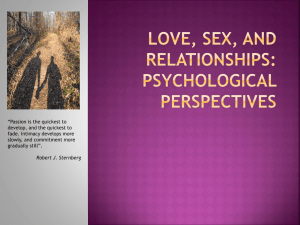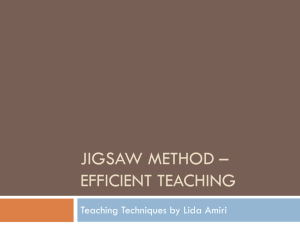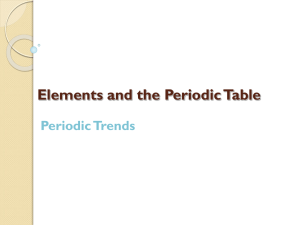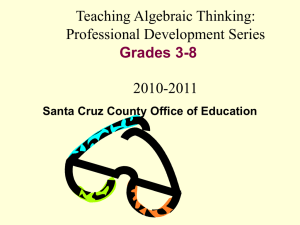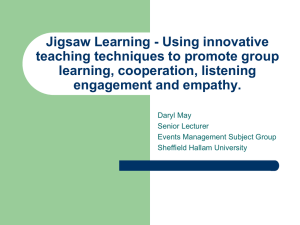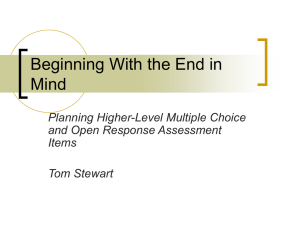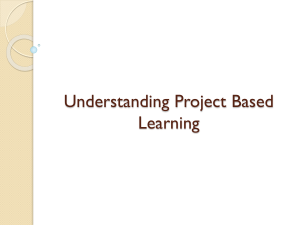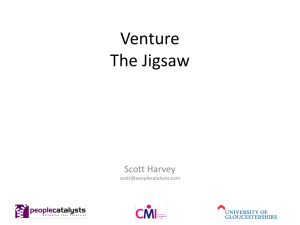2016 Syllabus - Stanley Teacher Prep
advertisement
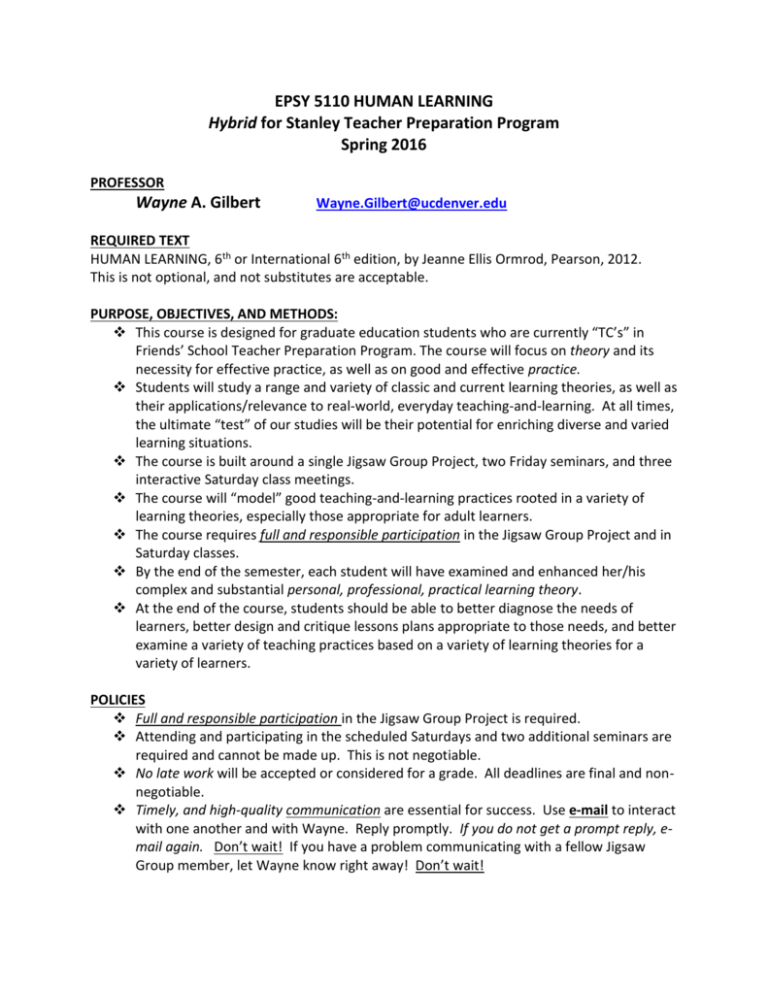
EPSY 5110 HUMAN LEARNING Hybrid for Stanley Teacher Preparation Program Spring 2016 PROFESSOR Wayne A. Gilbert Wayne.Gilbert@ucdenver.edu REQUIRED TEXT HUMAN LEARNING, 6th or International 6th edition, by Jeanne Ellis Ormrod, Pearson, 2012. This is not optional, and not substitutes are acceptable. PURPOSE, OBJECTIVES, AND METHODS: This course is designed for graduate education students who are currently “TC’s” in Friends’ School Teacher Preparation Program. The course will focus on theory and its necessity for effective practice, as well as on good and effective practice. Students will study a range and variety of classic and current learning theories, as well as their applications/relevance to real-world, everyday teaching-and-learning. At all times, the ultimate “test” of our studies will be their potential for enriching diverse and varied learning situations. The course is built around a single Jigsaw Group Project, two Friday seminars, and three interactive Saturday class meetings. The course will “model” good teaching-and-learning practices rooted in a variety of learning theories, especially those appropriate for adult learners. The course requires full and responsible participation in the Jigsaw Group Project and in Saturday classes. By the end of the semester, each student will have examined and enhanced her/his complex and substantial personal, professional, practical learning theory. At the end of the course, students should be able to better diagnose the needs of learners, better design and critique lessons plans appropriate to those needs, and better examine a variety of teaching practices based on a variety of learning theories for a variety of learners. POLICIES Full and responsible participation in the Jigsaw Group Project is required. Attending and participating in the scheduled Saturdays and two additional seminars are required and cannot be made up. This is not negotiable. No late work will be accepted or considered for a grade. All deadlines are final and nonnegotiable. Timely, and high-quality communication are essential for success. Use e-mail to interact with one another and with Wayne. Reply promptly. If you do not get a prompt reply, email again. Don’t wait! If you have a problem communicating with a fellow Jigsaw Group member, let Wayne know right away! Don’t wait! JIGSAW GROUP PROJECT The “jigsaw” method is cooperative strategy which is especially effective when a lot of material must be “covered” in a short amount of time. The material is divided into “pieces,” and each piece is assigned to a different group. Individual groups become “experts” in their assigned “piece” of the material, and teach it to the other groups. The method also encourages learners to create their own learning. See this link for more information and supporting research: https://jigsaw.org/ TC’s will be divided into 5 small groups of 4 (or 5 as determined by enrollment). Each group will be assigned chapters in the course text. These groups are called “expert groups.” Each expert group will design and develop a Learning Project which will share their expertise and teach their assigned chapters to the other TC’s in the course. Once Jigsaw Expert Group Learning Projects are completed and published/posted, each TC will become an individual learner, and complete at least three (3) of the Projects created by Jigsaw Groups other than their own. The Jigsaw Expert Groups will: Use notes, visual aids and on-line resources provided by group members; Collaboratively design and develop an on-line lesson or series of lessons on the assigned text topics; Include an interactive teaching/learning component in the lesson or lesson series; Collaborate at least once outside of the Saturday sessions, as well as during each Saturday sessions; Communicate among members of the Group as necessary to advance the Learning Project; Submit a rough draft for instructor approval; Polish and Publish/post the final Learning Project; Monitor lesson participation by TC learners; Record and report completion assessment data. Each member of the Jigsaw Expert Group will: Carefully read and study the assigned text chapters. Make notes and drawings or charts or maps or other visual aids regarding the chapters read and studied. Become an expert in the entire assigned material! Participate fully and contribute equally and responsibly in the Jigsaw Expert Group Project development; Communicate as required and necessary with other members of the Jigsaw Expert Group and with Wayne. Individually complete three (3) Jigsaw Projects developed by other Expert Groups. Individually review, scan, and otherwise familiarize her/himself with the entire text. OTHER ASSIGNMENTS Readings and Video assignments and notes as assigned (other than Learning Projects). A final summative Critical Reflection of a minimum of 5 pages on your personal learning. JIGSAW GROUPS #1 Chapters 4-5 #2 Chapters 8-9 #3 Chapters 10-11 #4 Chapters 14-15 #5 Chapters 16-17 Behaviorism Memory (components and storage/encoding) Memory (knowledge and retrieval) Complex Learning and Cognition Motivation GRADES Jigsaw Group Project Participation = Jigsaw Project Learner (3 @ 100 ea.) = Saturday Attendance (3 @ 100 ea.) = Notes and class preparation = Final Critical Reflection = Total points possible A = 97-100%; A- = 90-96%; B+ = 87-89% B = 84-86% B- = 81-83% 500 points 300 points 300 points 100 points 100 points 1300 points SCHEDULE OF TOPICS AND ASSIGNMENTS Seminar Thursday, January 14 What is Theory? Why Theory? Set up Jigsaw Groups, and make text assignments. Syllabus Review Assignment #1 DUE Saturday 2/20 1) Jigsaw Prep - Read and study assigned chapters. - Explore on-line resources regarding topics in your chapters—bring 2 or 3 good sites to share w/your group. - Find a TedTalk or other on-line lecture (of 12-20 minutes) on a topic from your assigned chapters. - Make good notes on your reading/study and on the TedTalk or other video lecture. No outlines or summaries. Notes! 2) Read Chapter Two on the brain. 3) Watch the following videos—and jot some notes/questions: Jill Bolte Taylor’s TedTalk: “My Stoke of Insight” http://www.ted.com/talks/jill_bolte_taylor_s_powerful_stroke_of_insight Daniel Tammet “different ways of knowing” http://www.ted.com/talks/daniel_tammet_different_ways_of_knowing Watch Michael Merzenich “on the elastic brain.” http://www.ted.com/talks/michael_merzenich_on_the_elastic_brain MeetingSaturday, February 20 The Brain Getting started on the Jigsaw Expert Group Project - Elements - Brainstorming - Exploring your notes and resources - Initial plan and design - Making a rough draft Learning Theory Musings Hand in your video notes on the 3 TedTalks about the brain, please. Assignment #2 DUE Saturday March 19 JIGSAW GROUP: 1) Complete a Rough Draft of your Jigsaw Group Project lessons or series of lessons, including intended outcomes, and an outline of learner activities, assignments and tasks. 2) Meet together at least once in your Jigsaw Group for consultation. 3) Submit a plan to Wayne for completing the Learning Project, including group member responsibilities. INDIVIDUALLY: 4) Read Chapter 12. Saturday, March 19 Completing and testing your Jigsaw Group Learning Project. Publish your Learning Project! Developmental factors in learning. - “the” developmental dynamic - Stories & learning By March 12, your Jigsaw Group Learning Project MUST be published for others to use! Seminar Thursday, April 14 “learning” = deposits or withdrawals? Treasure house or blank slate? Assignment #3 DUE Saturday April 30 As a learner, complete TWO (2) Learning Projects prepared by the other Jigsaw Expert Groups! Carefully read the text chapter summaries for each of the on-line Jigsaw Learning Projects you completed. Be prepared to talk about your learning re. each Project you completed. Read Chapter 13 in the text. Meeting Saturday, April 30 Topics: Social factors of learning (modeling, self-efficacy) Developing your own learning theory. Essential elements of learning theory for designing spaces, activities, assignments, curricula, etc. The Jigsaw Learning Project De-Briefing! “The Teacher as learner.” Assignment #4 DUE May 9 1) Complete a third (3rd) Learning Project prepared by the other Jigsaw Groups. 2) Read the text chapter summary for that Jigsaw Project. 3) Write and submit a Summative Critical Reflection of at least 5-pages double-spaced regarding your own learning about learning in this class, and its impact on your teaching practice or your thinking about teaching. Consider yourself as the learner in this reflection—and consider your own learning in terms of what we studied about learning. . . got it? By May 11, your Jigsaw Expert Group MUST submit the final assessment data for those who completed your Jigsaw Group’s Learning Project! DUE-DATES : A Check-list Assignment #1 DUE Saturday 2/20 - Jigsaw Prep & notes for your group. - Read Chapter 2 - TedTalks on the brain & jotted notes. Assignment #2 DUE Saturday 3/19 - Rough Draft of your Jigsaw Group’s Learning Project, - Jigsaw Expert Group meeting. - Submit a plan to Wayne for completing the Learning Project. - Read Chapter 12. Assignment #3 DUE Saturday 4/30 - Complete TWO (2) Jigsaw Learning Projects! - Carefully read the text chapter summaries. - Read Chapter 13 in the text. Assignment #4 DUE 5/ 9 - Complete a third (3rd) Learning Project. - Read the text chapter summary for that Learning Project. - Write and submit a Summative Critical Reflection. By 5/ 11, your Jigsaw Expert Group MUST submit the final assessment data.
